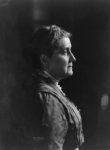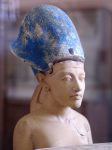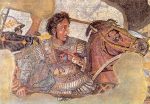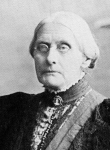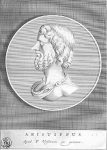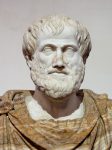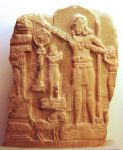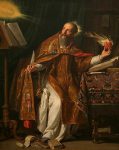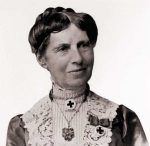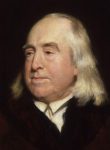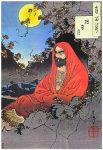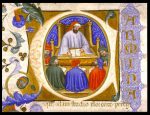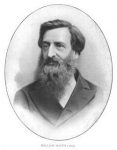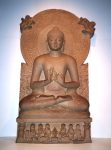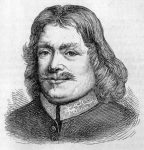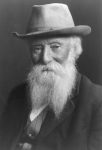Jane Addams was one of the first American public intellectuals, and a hugely successful activist and reformer as well. In 1931, she became the first American woman to win the Nobel Peace Prize. She may have been the most influential woman in American history. She founded Hull House, a "settlement house" intended to serve the poor of Chicago, in 1897, and lived there the rest of her life.
As time passed, she became a spokesperson for the poor, for women, for children, for families, for sanitation, for public health, for social and political reform, first in Chicago, then nationally, and finally throughout the world. Concern for the poor and minorities led her gradually into active politics. This included, in addition to municipal reform, winning voting rights for women and also a pacifist approach to world affairs.
In her time, Addams was as famous as a president, and her books were read everywhere.
King, 18th dynasty, the "heretic" Pharaoh. A religious mystic, possibly a pacifist, he instituted the first monotheism known to human history.
King of Macedonia and conqueror of Persia. Some see in him the spirit of youth, daring, courage, energy, hardihood, curiosity, vision, and the intellectual and artistic heritage of ancient Greece, which he spread widely, together with a tolerance and appreciation of other cultures.
Others see drunkenness, superstition, cruelty, vindictiveness, violence, killing both on and off the battlefield, lack of self-control, despotism, and the age-old gods of power, wealth, fame, and glory pursued to the point of madness.
Christian Hermit and later Saint. He sold all his possessions at twenty to give to the poor and entered into a life of strict solitude in the desert of Egypt.
After several decades, during which he reportedly experienced and overcame repeated temptations by the devil, he founded a monastic movement whose influence quickly spread. Members of the movement, often called anchorites, typically rejected books, learning and knowledge, and, in addition to seclusion, emphasized the most resolute asceticism. At its extreme, this meant self-starvation, wearing the same clothes until they rotted, never bathing or cutting hair, living in holes and old wells, carrying weights, or exposing oneself to venomous insect stings.
St. Antony did not indulge in the most violent penances, (although he reputedly never washed his feet), but his followers seemingly strove to outdo one another in self-immolation.
Social reformer and preeminent American feminist. She fought against alcohol and slavery but especially for a woman's right to be independent of her husband and to vote. With Elizabeth Cady Stanton, she founded the National American Woman Suffrage Association in 1869 and thereafter traveled tirelessly around the country speaking and agitating to promote the organization and its cause. She also co-authored a multi-volume history of the Women's Suffrage movement.
Philosopher. He lived in Athens, but was born in Cyrene in North Africa. Hence his philosophy was referred to as Cyrenaicism and his followers as Cyreniacs. Unlike his master Socrates, Aristippus unashamedly charged his pupils whatever the traffic would bear and by his own profession lived as extravagantly as he could.
Although no work of his survives, Cyrenaicism taught an unalloyed and unrepentant hedonism, with immediate pleasure (very much including physical pleasure) to be pursued, pain avoided, and other objects and ends of little account. But one should approach the pursuit of pleasure with a rational mind and a degree of self-control or pleasure will too easily turn to pain. As Aristippus said of an expensive female companion, "I have Lais, not she me."
It will be apparent that Aristippus's advice to give free rein to desires, to pursue pleasure without remorse, but not to fret over much when desires are thwarted, is actually quite difficult to follow, which ultimately limited its appeal.
Cyrenaicism was sometimes confused with Epicureanism, but in the latter pleasure is defined very differently as a calm, undisturbed mind supported by good physical health, not by physical enjoyment or luxuries.
Philosopher, pupil of Plato, and tutor to Alexander the Great. His work ranged widely over logic, metaphysics, physics, biology, zoology, natural history, history, politics, rhetoric, moral philosophy, psychology, and poetry.
Although his most important works perished, enough survived, principally through Arab sources, that he became the greatest secular authority of the late Medieval and Renaissance world, so much so that for a time his commanding presence stifled further investigation and free thought. This was especially ironic because his surviving work expressed the value of free study and thought above all, both in the form of logic and especially of empiricism, of careful observation of the world around us, of a primary reliance on the evidence of our own senses and our own mind rather than on an external authority, no matter how masterful and prestigious that authority may be.
Aristotle's moral philosophy suggested that happiness should be our goal (Eudamonism), that virtue was a reliable means to this end, and that virtue usually represented a "golden mean" between opposite extremes. This approach to a happy life did not seem to require religion, especially the quasi-mystical religion of Plato, but it did require philosophical contemplation which in turn depended on financial independence or subsidy and the leisure that such independence or subsidy made possible. Supreme happiness was therefore reserved for the few.
Aristotle also emphasized the importance of friendship for happiness, all the more so since women and children were subordinate in classical Greece and thus less suitable for intellectual intimacy. (Montaigne felt the same way in Renaissance France, that psychic, as opposed to physical, intimacy should be reserved for close male friends.)
Other Aristotelian positions are equally rooted in the circumstances of his time, including his positive valuation of political autocracy and slavery. Although he probably regarded both as natural and inescapable, any opposition to autocracy during his lifetime would have been extremely dangerous and futile.
Legendary king. Arthur is said to have valiantly defended his Celtic and Christian realm against pagan Anglo-Saxon invaders. His court at Camelot, with its famous "round table" of dedicated knights drawn from all over Europe, came to represent all the finest ideals of courtly love, of honour, of self-sacrificing service to God, country, and humanity, of knightly chivalry, and of mystical devotion to God's Holy Grail. Although there are references to Arthur by a variety of Medieval writers, the most complete account is Sir Thomas Malory's Le Morte d'Arthur, written in the 15th century nearly a thousand years after Arthur is supposed to have lived.
Mauryan King of India. After a conventional, ruthless, and successful military career dedicated to the pursuit of power and conquest, Asoka unexpectedly changed course. He converted to Buddhism and dedicated the rest of his life to useful public works and especially to the propagation of principles of non-violence, toleration, kindness (especially to slaves and inferiors), generosity, and charity collectively referred to as dhamma.
Asoka's new philosophy was circulated throughout the kingdom as a series of Edicts which were inscribed on large granite stones, some of which have survived.
Christian bishop, theologian, later Saint. Augustine's starting point is a ringing affirmation of religious faith. ("Credo ut intelligam": "I believe in order to understand.")
He rejects the prodigal life of his youth (not so prodigal by modern standards but including an illegitimate son), a life vividly described and condemned in his Confessions, perhaps the most influential autobiography ever written. He also rejects the Manichaeism (see Manichaeus) of his youth, along with Donatism (see Donatus), Pelagianism (see Pelagius), skepticism, and Platonism (see Plato), although he incorporates elements of Neo-platonic mysticism into his theology. He accepts Aristotle's emphasis on happiness and on virtue as a means to happiness, but identifies virtue with love of God rather than with Aristotle's golden mean.
Augustine's entire thought, notwithstanding its reliance on logic and its sometimes dense metaphysics, including its defense of a doctrine of predestination, may be summarized by his saying: "Love [God] and do what you will."
Critics of St. Augustine charge him with nurturing an alliance between Church and State that leads to and justifies official persecution of non-believers.
Soldier and social organizer. He became well known to the British public for his celebrated defense of Mafeking in South Africa during the Boer War. After his retirement from the military, he founded the Boy Scouts and (with his sister) the Girl Guides (Girl Scouts in the U.S.). Scouting quickly became an international movement seeking to teach youths good character ("A scout is truthful.") as well as skills and a love of the outdoors.
Founder of U.S. Red Cross. She founded the U.S. Red Cross in 1881 as part of the International Red Cross and served as its president until 1904. She also successfully lobbied for the U.S. to join the Geneva Convention governing the treatment of prisoners.
Philosopher and jurist. He first employed the term utililitariansim and wrote and spoke widely on the importance of advancing the good of society through acts and rules. Bentham made up a "hedonic calculus" to measure how much pleasure an act would generate. He also turned his philosophy to the practical, designing an ideal school and prison.
Writer and scholar. Influential Italian poet, author of Decameron, a celebration of Bohemian lifestyles, in addition to other works.
Monk. He traveled from India to China where he met with the Emperor and planted the seeds of Zen Buddhism, emphasizing meditation and intuitive modes of knowledge. From there, Zen spread to Japan where it flourished.
Philosopher and statesman. A powerful figure in Italy, he fell out with the monarch, was imprisoned and tortured to death. He translated Porphyry and Aristotle, giving medieval Europe the classic texts on logic. While in prison, he wrote the Consolation of Philosophy, one of the most famous works of philosophy, which reiterated traditional stoic themes of attaining happiness by reining in the emotions, and especially the emotion of desire.
He founded the Salvation Army, a Christian group organized on quasi-military lines, which emphasizes selfless service of and assistance to the poor and needy. The group has had an immense impact.
The founder of Buddhism. Whether he developed a religion or a philosophy is highly debatable. He was a philosophical empiricist, the first in world history, and firmly rejected metaphysics or any form of speculation not supported by our five senses.
On the other hand, he was not solely an empiricist. He was also a mystic who practiced the deepest forms of meditation. And he was an ethical teacher who counseled that unrestrained desires are a snare, an illusion, and the source of human unhappiness.
The Dhammapada, a collection of the Buddha's sayings, is one of the great texts in the field of values.
Preacher, author. Author of The Pilgrim's Progress, a much quoted and loved Christian text, and a classic exposition of Christian puritanism.
Naturalist and writer. He settled in a rustic cabin to study the natural world and write about life in the country. His work had an immense impact in the 19th century and encouraged an almost mystical appreciation of nature which contributed to the birth of the modern environmental movement.
